COMMENTARY
Mitt Romney, evidently eager to draw the press away from his own unauthorized footage problem, has alighted on the strategy of suggesting recently excavated audio of Barack Obama proves him to be radically in favor of some level of "redistribution" to help give people a fair shot. The audio's authenticity hasn't yet been verified, though Obama campaign staff have not challenged its accuracy.
That offending line allegedly comes from 14-year-old unearthed audio of then-Illinois State Senator Barack Obama speaking at Loyola University. Obama's purported endorsement of milquetoast New Democrat center-leftism was first broadcasted by the intrepid, caps lock enthusiast Matt Drudge. The scoop then spread to the Fox empire: Fox News' Fox & Friends, Fox News' Gretawire, and the website of Fox News valedictorian Glenn Beck. Presumably it was at this point that Mitt Romney, as loathe as he is to run a negative campaign, decided to weigh in.
"The president’s view is one of a larger government," Romney told—Guess who?—Fox News. "There’s a tape just came out today with the president saying he likes redistribution. I disagree."
That redistribution is wrong on its face has been a Republican truism for so long that it's easy to forget what that actually means. A totally non-redistributive government doesn't have a welfare-for-work policy; it has a no-safety-net-of-any-kind policy. No health care vouchers, no Medicare, no social security, no financial aid, nothing. And it's not just the safety net that goes away. Progressive taxation and tax credits are both forms of redistribution. So are corporate subsidies. In a completely non-redistributive state, the government collects money based on a flat tax and puts it towards, I guess, arming cops. Maybe the occasional road, or some new toner ink for the White House fax machine. But that's it.
To be fair, President Romney would probably not run a redistribution-free government in practice, even if his party controlled the Supreme Court and both houses of Congress. Florid rhetoric aside, Obama and Romney's redistributive philosophies are differentiated only by degrees. A candidate who was really opposed to all redistribution would not endorse, as Romney has, Medicare vouchers or welfare for work.
That the right is spinning news out of a moderate Democrat's preference for some level of redistribution tells us a few things. Firstly, it tells us that this campaign has gone on for far too long. Secondly, it tells us that the right wing is so deeply wedded to its vision of Obama as a radical that it will interpret pretty much any public statement he makes, no matter how innocuous, as proof of his radicalism. Thirdly, it tells us that the American right is so far out there that it can mistake Clintonian Democratic centrism for some kind of revolutionary Islamo-Communism.
Here's how Jon Chait paraphrases the offending "redistribution" line: "Obama asserts that he believes in redistribution, but only to a degree, and that it is necessary in order to provide greater opportunity to participate in the market, which is also one of the least radical justifications for redistribution."
That's exactly right, and the audio as it's been circulated doesn't plausibly support any other interpretation. The problem for Romney is this: that interpretation isn't a radical leftist idea. In fact, it is, or at least was, a center-right idea.
A genuinely left-wing president would not support redistribution on the basis that it provides people with "a shot" in life. A left-wing president would support redistribution on the grounds that no one should go hungry or homeless, particularly in a country with our wealth, period. To this hypothetical president, the idea that welfare should be used primarily as a means of coercing the poor into market participation—the idea behind former President Clinton's bipartisan "welfare for work" scheme—would be appalling.
President Obama sharply disagrees with that view, because he's not particularly left-wing. Mitt Romney disagrees with that view as well, but he takes his disagreement several steps further than the president; Romney repudiates any form of redistribution whatsoever.
That is not to suggest that, given the chance, Romney wouldn't happily dismantle yet more of our already shambolic welfare state. But his avowed contempt for redistribution isn't as far from Obama's grudging endorsement of it as either would like you think. Both frame their welfare policy as a road to a country where, if you are a productive market actor—i.e., "if you work hard and play by the rules," to borrow a tired phrase from the Democratic National Convention—you deserve some level of economic security. Neither has very much to say about the people who don't work hard enough, or stick to their rules.
